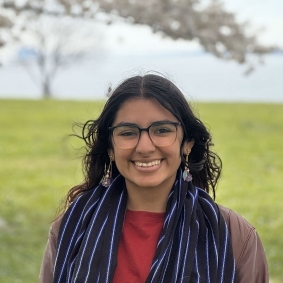Knauss legislative fellowships in Congress help build careers — and they're fun and educational. See our video and fact sheet for details.
Jessica Diaz

Fellowship Institution:
NOAA Office of the Under SecretaryStart Year:
2024Jessica Diaz is a 2024 Knauss Executive Fellow at NOAA in the Office of the Under Secretary/NOAA Administrator. In this position, she is a member of the Under Secretary's Infrastructure team that oversees the implementation and organization of ~$6B for NOAA under the Bipartisan Infrastructure Act and Inflation Reduction Act investments.
Originally from Houston, Texas, Jessica grew up in an environmental justice community and keeps this experience at the core of her work. She left Houston to pursue a B.S. in Fisheries & Wildlife at Michigan State University with minors in Music and Science, Technology, Environment, & Public Policy (STEPP) and received training in equity and justice in the environmental field as a scholar of the Doris Duke Conservation Scholars Program at Northern Arizona University. Jessica completed her M.S. in the Marine, Estuarine, & Environmental Sciences Graduate Program at the University of Maryland Baltimore County (UMBC). She was a UMBC ICARE (Interdisciplinary Consortium for Applied Research in the Environment) Trainee, focusing her thesis research on oyster restoration in the Baltimore Harbor with an emphasis on community engagement. In her free time, Jessica enjoys playing music, backpacking, gardening, traveling to see friends and family, and spending time with her partner and two cats.
Call for Symposium Presenters and Authors
The Chesapeake Rising: Innovative Law and Policy Solutions for Climate Adaptation in Coastal Communities symposium will explore key legal and policy considerations that affect climate adaptation strategies. It provides a unique opportunity for upper-level law students and early-career lawyers to present and publish their legal scholarship.
Program Announcements
-
-
Maryland Sea Grant has program development funds for start-up efforts, graduate student research, or strategic support for emerging areas of research. Apply here.
News and Blogs
Video Gallery
Sea Grant Film Explores a Diminishing Smithville
Smithville is a community on Maryland’s Eastern Shore, on the edge of the Blackwater National Wildlife Refuge. A century ago, Smithville had more than 100 residents. Today, it has four, in two homes: an elderly couple, and one elderly woman and her son, who cares for her.
Featured Fellow
Featured Research Project
Developing a habitat model for mysids, an important link in Chesapeake Bay food webs
Mysids are important mesozooplankton prey for many species of fish in Chesapeake Bay and are an important link in transferring energy from lower to upper trophic levels. Mysids also serve as biological vectors for benthic-pelagic coupling due to their diel vertical migration and omnivorous prey-switching behavior, which makes mysids important regulators of food web architecture. Despite their central role in coastal food webs, surprisingly little is known about mysid ecology and dynamics in Chesapeake Bay.
The Blue Crab: Callinectes Sapidus
An essential resource for researchers, students, and managers. Get your copy today!


©2025 Maryland Sea Grant. All rights reserved.
5825 University Research Court, Suite 1350 | College Park, MD 20740
Phone: (301) 405-7500 | Fax: (301) 314-5780 | Contact Us



